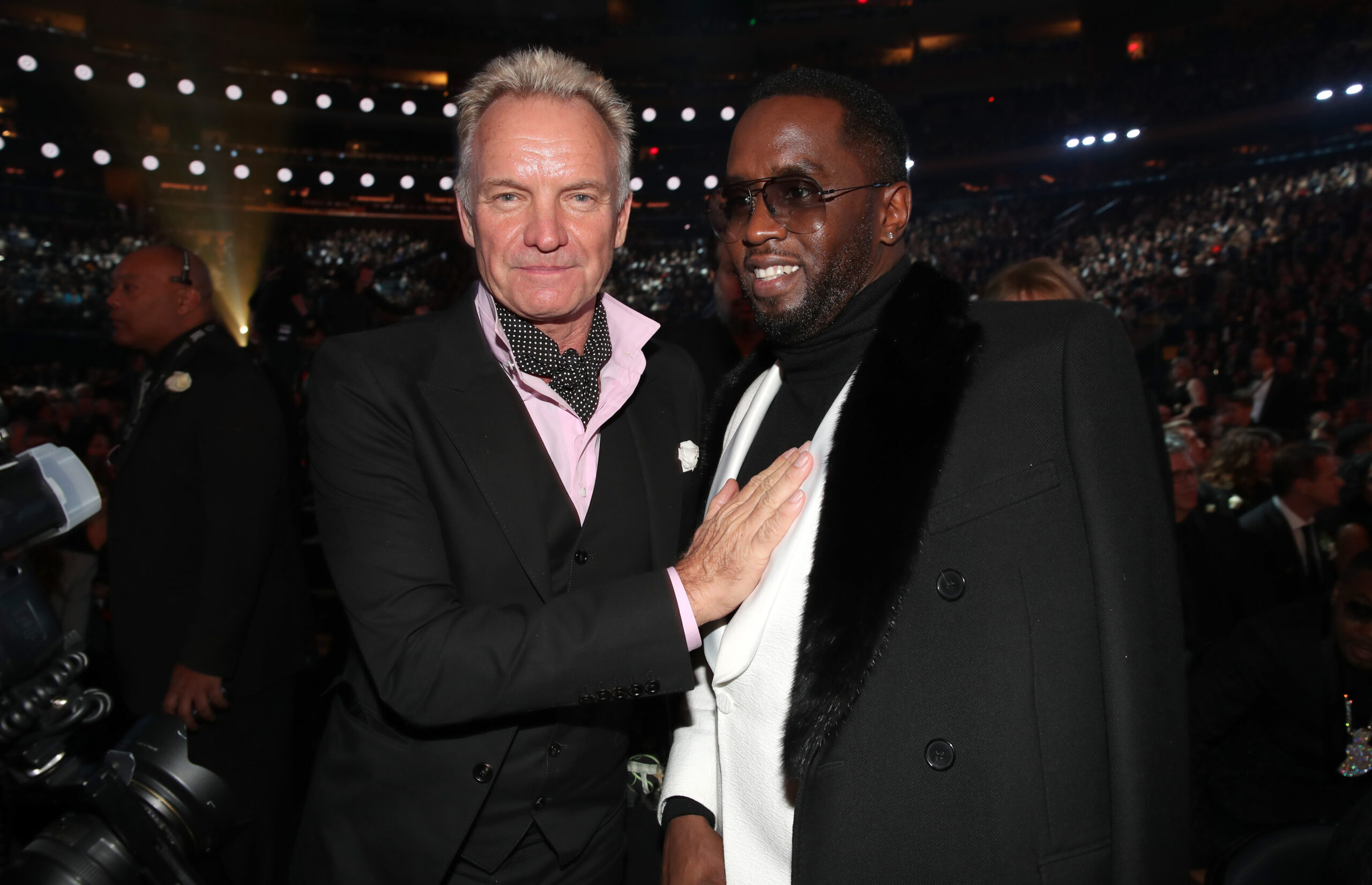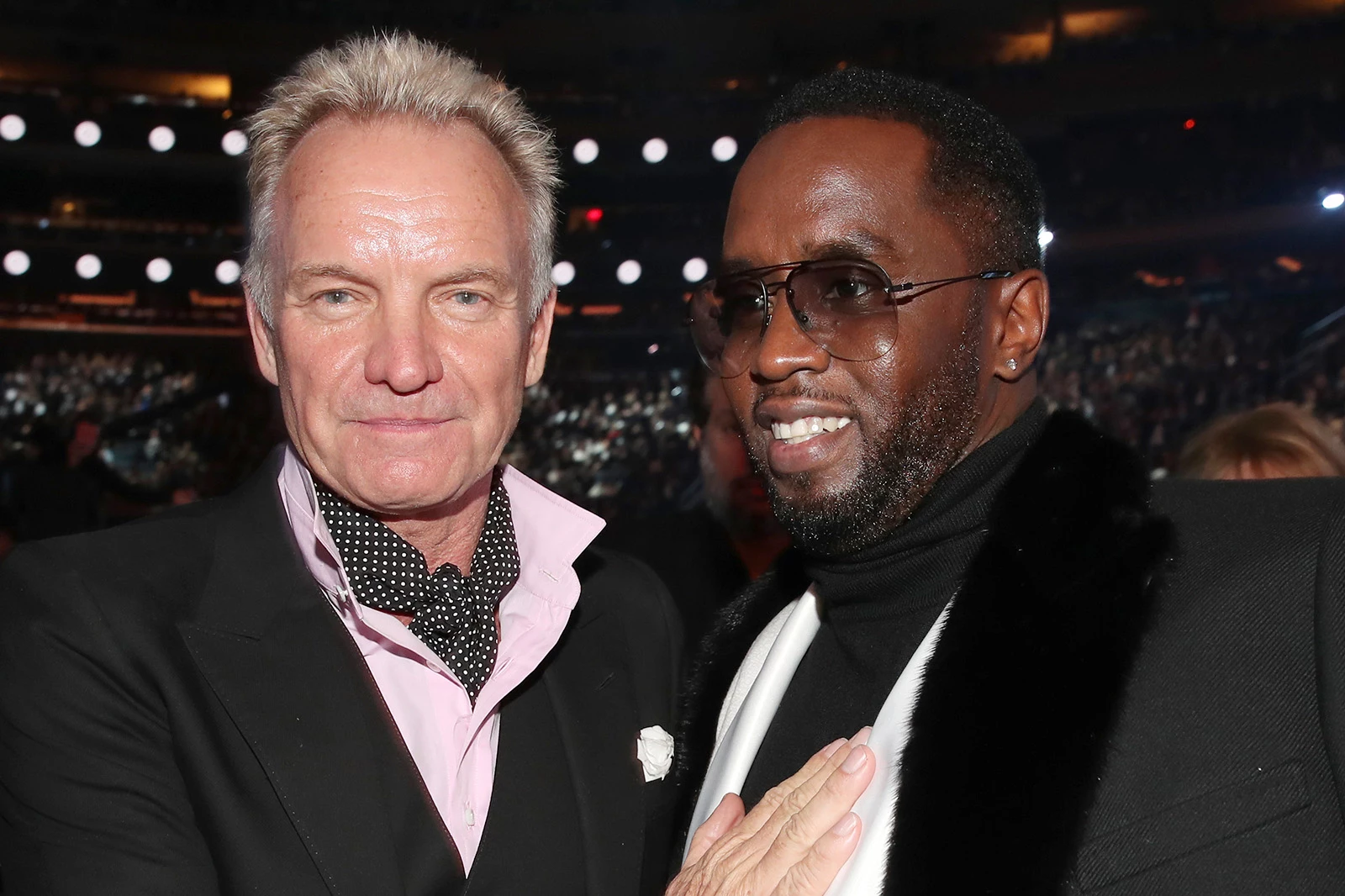There's a story that has floated around the music world for a good while, a tale of a rock legend and a hip-hop mogul, and a rather significant sum of money changing hands every single day. It’s about a classic song, a famous sample, and the ongoing payments that keep flowing. People often wonder just how much does Sting make from P Diddy, and the answer, as it turns out, involves quite a considerable amount, a sum that many would find quite eye-opening, so to speak.
The connection stems from one of the most recognizable hip-hop tracks of the late 1990s, P Diddy's "I'll Be Missing You," a heartfelt tribute that became a global hit. This song, as many know, borrows its main musical idea from The Police's timeless tune, "Every Breath You Take." That musical borrowing, that little piece of a melody, is the very thing that ties these two music giants together financially, and it’s a rather interesting situation, you know.
The financial arrangement between these two artists has been the subject of much discussion and, frankly, some amazement. It highlights the lasting value of songwriting, the rules around using other people's creative work, and just how much one original piece can continue to generate for its creator, perhaps for decades. It's a situation that truly shows the long-term earning power of a well-loved song, and it's quite a lesson in music business dealings, actually.
- Liam Payne Wiki.https
- Hikarinoakari.https
- Aishah Sofey Onlyfans.https
- Orlando Brown Diddy.https
- Liam Payne Jaw.https
Table of Contents
- Sting's Story - A Musician's Life
- What is the Story Behind "I'll Be Missing You" and "Every Breath You Take"?
- Why Does Sting Get So Much From P Diddy?
- How Do Music Royalties Work Anyway?
- What Does This Mean for Other Artists?
- How Much Does Sting Make From P Diddy - A Summary
Sting's Story - A Musician's Life
Gordon Matthew Thomas Sumner, known throughout the world as Sting, is a musician who has enjoyed a very long and successful run in the music business. He first gained widespread attention as the lead singer, bass player, and primary songwriter for the rock band The Police. The group formed in the late 1970s and quickly rose to fame with their unique blend of punk, reggae, and new wave sounds, producing several chart-topping hits that are still widely played today, so they are.
After The Police went their separate ways, Sting embarked on a solo career that proved just as successful, if not more so, in some respects. He explored different musical styles, incorporating elements of jazz, classical, and world music into his work. His solo albums have earned him numerous awards and a dedicated global following. He is, by many accounts, considered one of the most enduring and influential figures in contemporary music, which is quite a feat, really.
His songwriting has always been a standout feature of his work. He possesses a knack for crafting memorable melodies and thoughtful lyrics that resonate with a large audience. It's this skill, this ability to create songs that stick with people, that forms the basis of his lasting financial success, especially when it comes to situations like the one with P Diddy, you know. His compositions have a certain timeless quality, and that, in itself, is a truly valuable asset.
- Are Kourtney And Travis Still Married.https
- 324 Front Street Barnum Iowa.https
- Kirstentoosweet Onlyfans.https
- David Muir In Relationship.https
- Laura Ingraham Husband.https
| Detail | Information |
|---|---|
| Full Name | Gordon Matthew Thomas Sumner |
| Known As | Sting |
| Date of Birth | October 2, 1951 |
| Place of Birth | Wallsend, Northumberland, England |
| Occupations | Musician, Singer, Songwriter, Actor |
| Associated Acts | The Police, Solo Artist |
| Genres | Rock, New Wave, Pop, Jazz, World Music |
| Years Active | 1971–present |
| Instruments | Vocals, Bass Guitar, Guitar, Lute |
What is the Story Behind "I'll Be Missing You" and "Every Breath You Take"?
The story of "I'll Be Missing You" is, in many ways, a sad one. P Diddy, then known as Puff Daddy, released the song in 1997 as a tribute to his friend and fellow artist, The Notorious B.I.G., who had passed away earlier that year. The song became an enormous hit, reaching the top of the charts in several countries and selling millions of copies around the globe. It was a powerful expression of grief and remembrance, and it truly connected with listeners everywhere, as a matter of fact.
The musical foundation for "I'll Be Missing You" comes directly from The Police's 1983 hit, "Every Breath You Take." The iconic guitar riff and chord progression from Sting's song are clearly present throughout Diddy's track. This use of an existing piece of music, known as sampling, is a common practice in hip-hop and other genres, but it comes with specific rules and requirements, especially when it involves such a well-known original, as I was saying.
For artists who wish to use a sample, getting permission from the original creators is a really important step. If permission is not secured before the new song is released, it can lead to legal issues and, more often than not, a significant financial penalty for the artist who used the sample. This is exactly what happened with "I'll Be Missing You" and "Every Breath You Take," and it set the stage for Sting's ongoing earnings, which are quite substantial, you know.
How much does Sting make from P Diddy's song?
The exact figure for how much does Sting make from P Diddy has been a topic of much fascination. While the precise, day-to-day accounting is usually kept private, a widely reported figure, confirmed by Sting himself in various interviews, suggests that he receives a very considerable sum. It's often stated that he makes around $2,000 every single day from the use of "Every Breath You Take" in "I'll Be Missing You." This amount is a large quantity, reflecting the song's widespread and continued success, and it's a truly remarkable income stream, basically.
This daily payment adds up to a truly large amount over time. If you consider $2,000 a day, that's $14,000 in a week, and over $60,000 in a month. Annually, this could amount to something like $730,000, just from this one sample. This is a very significant degree of income, especially for a song that was released decades ago, and it really highlights the long-term financial impact of music rights, pretty much.
It's important to remember that this income is largely passive for Sting. He doesn't have to perform the song or actively promote it to receive these payments. The money comes in as a result of the original agreement and the continued popularity of Diddy's track. This shows the lasting value of owning the rights to a globally recognized piece of music, and it’s a rather enviable position to be in, honestly.
Why Does Sting Get So Much From P Diddy?
The reason Sting receives such a large share of the earnings from "I'll Be Missing You" goes back to the initial agreement, or rather, the lack of one. When P Diddy released "I'll Be Missing You," it became clear that proper permission to use the "Every Breath You Take" sample had not been secured beforehand. This is a big deal in the music business, as it means using someone else's copyrighted work without their consent, which is something that can lead to serious legal trouble, you know.
Sting, as the sole songwriter of "Every Breath You Take," holds the publishing rights to the song. These rights give him control over how his composition is used and entitle him to a share of the income generated from its use. When Diddy's song became a massive hit, Sting's team stepped in to address the unauthorized sample. Rather than a lengthy legal battle, a settlement was reached, giving Sting a very substantial portion of the publishing royalties from "I'll Be Missing You," and it's a truly telling example of how these situations can play out, actually.
The reported agreement gave Sting a full 100% of the publishing royalties from "I'll Be Missing You." This means that every time the song is played on the radio, streamed online, used in a commercial, or sold, a significant portion of the money earned from the publishing side goes directly to Sting. This is a rather uncommon arrangement, as typically, artists who sample might give up a percentage, but not the entire publishing share, so it's almost a unique case.
Is that a lot of money Sting gets from P Diddy?
To put it plainly, yes, the amount of money Sting gets from P Diddy is a very large amount. In the world of music royalties, it's quite rare for an artist who has been sampled to receive such a high percentage of the new song's earnings, especially the entire publishing share. Most sample clearances involve a negotiation where the original artist might receive a percentage of the publishing or a one-time fee, but not usually the full amount, as a matter of fact.
The fact that this income stream has continued for over two decades also makes it a truly significant financial gain. "I'll Be Missing You" remains a popular song, played frequently on various platforms, which means the money keeps coming in for Sting. This ongoing, very large income from a single sample is what makes this particular case so notable and often talked about, and it truly shows the lasting financial power of a well-placed sample, in a way.
It serves as a powerful reminder of the value of intellectual property in the music industry. Sting's original composition was so strong and so clearly identifiable that its unauthorized use led to a very favorable outcome for him. It underscores that songwriters, as the creators of the core musical work, hold a very important position when it comes to the long-term earnings of a song, and that's something artists need to consider, pretty much.
How Do Music Royalties Work Anyway?
Music royalties are the payments made to songwriters, composers, publishers, and other rights holders for the use of their musical works. There are several types of royalties, each generated by different uses of a song. For instance, mechanical royalties are paid when a song is reproduced, like on a CD, vinyl, or through digital downloads. Performance royalties are generated when a song is played publicly, such as on the radio, in a restaurant, or through streaming services, so they are.
Then there are synchronization royalties, which are paid when a song is used in visual media like films, television shows, commercials, or video games. Print royalties come from sheet music or lyrics being reproduced. Each of these different uses generates money, and that money then gets distributed to the various people who own a piece of the song, which can be quite a few, actually.
The two main components of music rights are the sound recording (the master recording) and the musical composition (the underlying song, including melody and lyrics). The sound recording rights are usually owned by the record label or the recording artist. The musical composition rights, however, are owned by the songwriter and their music publisher. In the case of "Every Breath You Take," Sting is the songwriter, and he also controls the publishing, which is a key detail, you know.
What about the publishing rights in how much does Sting make from P Diddy?
The publishing rights are the very core of why Sting receives such a large sum from P Diddy. As the sole songwriter of "Every Breath You Take," Sting owns 100% of the song's publishing. This means he controls the rights to the melody, lyrics, and overall structure of the song. When "I'll Be Missing You" sampled "Every Breath You Take," it was the musical composition, the underlying song itself, that was used without permission, and that's a very significant point, really.
Because Sting owns the publishing, he is entitled to a share of the royalties generated every time "I'll Be Missing You" is played or sold. The fact that he secured 100% of the publishing royalties from Diddy's song means that a very large portion of the money that song earns from its composition use goes directly to him. This is distinct from the master recording rights, which would belong to The Police's record label, but the publishing is what truly drives Sting's substantial income in this situation, as a matter of fact.
This situation truly illustrates the lasting power and financial value of a songwriter's work. A song, once created, can continue to generate income for its creator for many, many years, especially if it's sampled by another successful artist. It's a testament to the enduring nature of a well-crafted piece of music, and it really shows the importance of intellectual property in the creative industries, so it does.
What Does This Mean for Other Artists?
The story of Sting and P Diddy offers a clear lesson for other artists, especially those who create music that might involve sampling. It highlights the absolute necessity of clearing samples before releasing any new music. Failing to get proper permission can lead to serious financial consequences, as seen in this case, where the original creator ends up with a very large portion of the new song's earnings, and that's something to think about, you know.
For artists looking to sample, it means being prepared to negotiate and potentially give up a significant share of their new song's income. It also means understanding that the original work holds immense value, and its creators are entitled to be compensated for its use. It's a reminder that respecting intellectual property is not just a legal requirement but a fundamental part of the music business, pretty much.
On the other hand, for songwriters and original creators, this story shows the lasting financial potential of their compositions. A hit song can generate income for decades, even if it's used in unexpected ways by other artists. It underscores the importance of registering your work, understanding your rights, and being prepared to protect your creative output. It's a powerful example of how a song can truly be a long-term asset, actually.
How Much Does Sting Make From P Diddy - A Summary
This article explored the well-known financial arrangement between Sting and P Diddy, focusing on the substantial daily income Sting reportedly receives. We looked into Sting's background as a musician and songwriter, and the history of "I'll Be Missing You" using the sample from "Every Breath You Take." The discussion covered the reasons behind Sting's considerable earnings, specifically his ownership of the publishing rights and the initial lack of proper sample clearance. We also touched upon how music royalties generally operate and the specific role of publishing rights in this particular situation. Finally, the implications of this case for other artists in the music world were considered.
- Rebecca Sneed Net Worth.https
- Is Ainsley Earhardt Engaged To Sean Hannity.https
- Sara Sidner.https
- Sabrina Carpenter Height And Weight.https
- Hd4hub In


